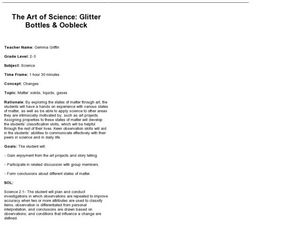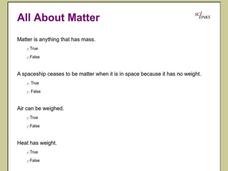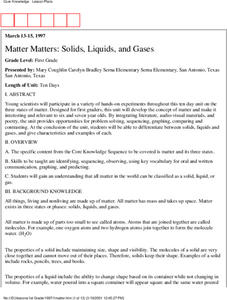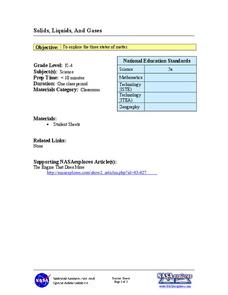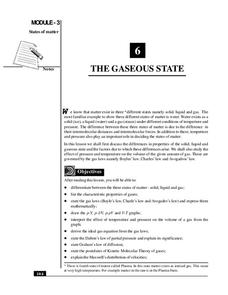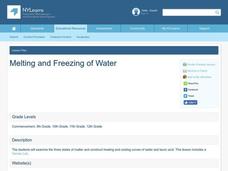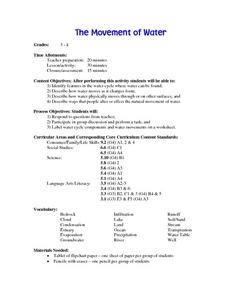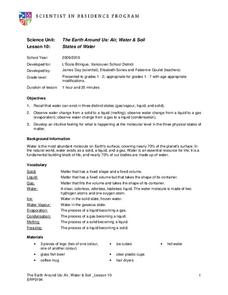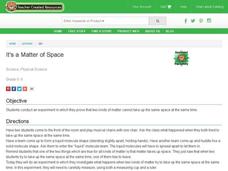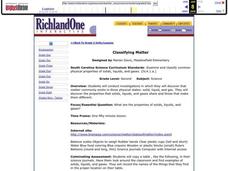Curated OER
The Art of Science: Glitter Bottles and Oobleck
After having a class discussion on the three states of matter, young scientists utilize the wonderful substance, Oobleck in order to experience something that changes states of matter. They also create "sparkle jars" which...
Curated OER
Matter: The 3 States of Water
The states of water are the focus of this PowerPoint. The presentation includes definitions of liquids, solids, and vapors. It also includes examples and illustrations of each of the states of water and information about how water can...
Curated OER
All About Matter
Twenty-four questions about matter, the states of matter and the properties of matter make up this interactive online worksheet. Your class will determine the volume of water, the shape of water and the shapes of matter.
Curated OER
Three Regions of North Carolina
Fourth graders investigate the three regions of North Carolina using works of art.
Curated OER
Matter Matters: Solids, Liquids and Gases
Scientists participate in a variety of hands-on experiments in this ten-day unit on the three states of matter. Lessons incorporate literature, a-v materials, and poetry to help students differentiate between solids, liquids and gases.
Curated OER
Ooblek
Students demonstrate the three states of matter. For this matter lesson, students read Bartholomew and the Ooblek. Students create "ooblek" and discuss what state of matter it is.
Curated OER
Solids, Liquids, and Gases
Students investigate and explore the three states of matter. They read and discuss the NASA article "The Engine That Does More," identify examples of each state of matter, and as a class complete a section of two worksheets. They...
Curated OER
What State Are You?
Students identify three states of matter and recognize plasma as fourth state. They provide examples of matter that are classified in particular state and identify properties of each state of matter.
Curated OER
Discovering the Properties of Matter
Learners identify the properties of the three states of matter and observe the movement of Oobleck and be able to compare its movement to that of solids and liquids. They record in their Science Journal what they discovered about Oobleck.
National Institute of Open Schooling
The Gaseous State
Sixth in a series of 36, this lesson focuses on gases and their behavior in given situations. Learners review the states of matter and then focus on gases, specifically learning Boyle's, Charles's, Avogadro's Laws, Dalton's, and Graham's...
Curated OER
Physical Changes and the Water Cycle - Three
Third graders observe and reproduce the water cycle in their very own classroom. A simple, yet very effective, demonstration on how water evaporates is observed by the young scientists. They make observations and sketches in their...
Curated OER
Melting and Freezing of Water
Students examine the three states of matter. They identify the segments of heating and cooling curves. Students analyze data and create a graph to determine the freezing and melting temperature of water.
Curated OER
The Movement of Water
Here is an excellent lesson plan on the water cycle and the states in which water exists. Learners identify the features of the water cycle, describe how water changes form, and look at ways that people affect the natural movement of...
Curated OER
States of Water
Students investigate the 3 states of matter. In this physical science "matter" lesson, students observe and participate in a number of demonstrations involving melting and freezing water. Students observe the effect heat has on changing...
Curated OER
It's a Matter of Space
Students explore matter. In this physical science lesson plan, students role play the 3 states of matter forming "liquid" molecules and "solid" molecules with teammates. Students perform an experiment in which the result illustrates that...
Curated OER
Cold, Clouds, and Snowflakes
Young scholars explore satellite data and graphing. In this weather data analysis math and science lesson, students analyze NASA satellite data to draw conclusions about geographical areas where precipitation might have happened. Young...
Curated OER
Matter and Molecular Motion
Fourth graders define the states of matter and their properties. They demonstrate the air is matter and observe the effect of molecular motion through these activities.
Curated OER
The Physical Behavior of Matter
Learners distinguish between three phases of matter: solid, liquid and gas, on the molecular level. They compare and predict the relative compressibility of the three phases of matter through journal writings and drawings.
Curated OER
What's the MATTER in our School?
While working in small groups, students use a digital camera to take pictures of various states of matter around the school grounds. Then they download the images onto the computer. The students then have to type or list the three states...
Curated OER
Classifying Matter
Second graders conduct investigations to explore matter. In this states of matter instructional activity, 2nd graders complete four activities to analyze the three states of matter. Students analyze the properties of solids, liquids, and...
Curated OER
Changes In Matter, "The Big Chill"
Third graders investigate why ice cream does not go through any chemical changes when it is exposed to physical changes. They describe the three states of matter in either written or verbal form. Then students experiment with ice cream...
Curated OER
Solids, Liquids, Gases
There are three states of matter, liquid, solid, and gas. Each are covered briefly in this very short presentation. The energy cycle is depicted in a chart and the states of matter are defined but this isn't a complete or...
Curated OER
States of Matter
Learners discuss a given set of questions based on Chemistry and matter and review a glossary of terms. They conduct experiments on each state of matter: "Dry ice and water, Dry ice and soap and Dry ice and Isopropyl Alcohol." and...
Curated OER
Academic Raceway: Matter
This PowerPoint enables students to review concepts about the states of matter. This interactive review game provides students with an opportunity to demonstrate their knowledge of subject specific vocabulary.


